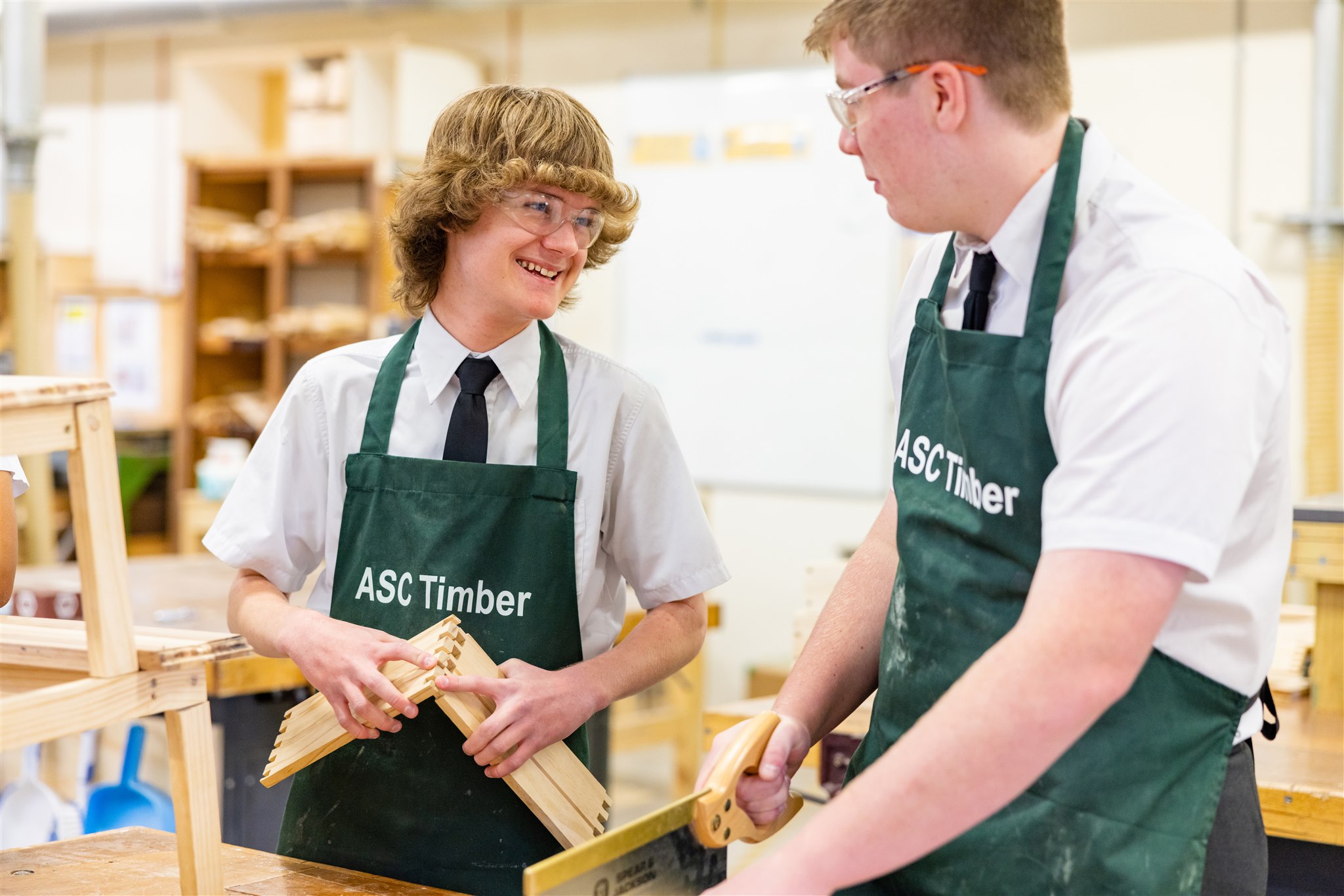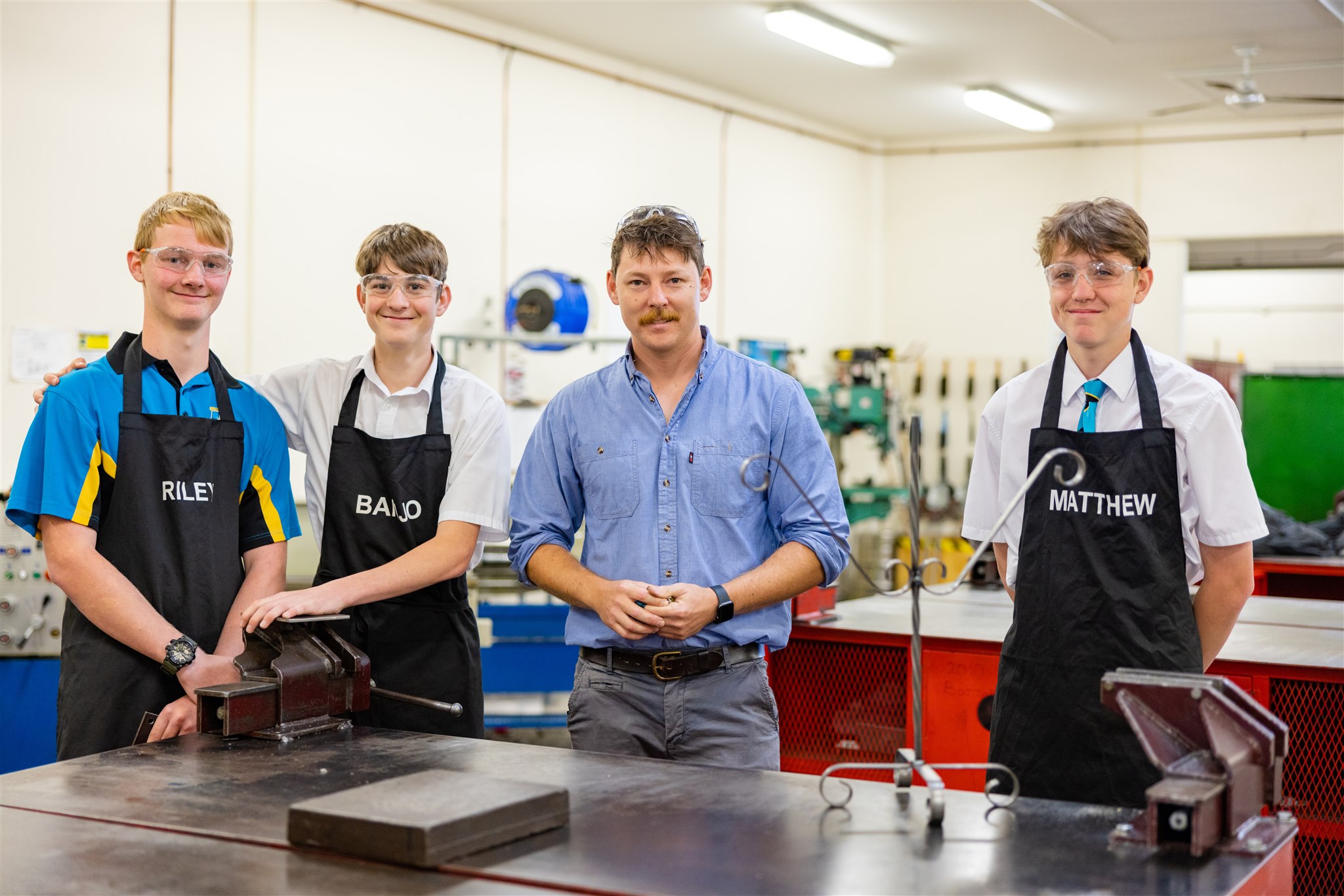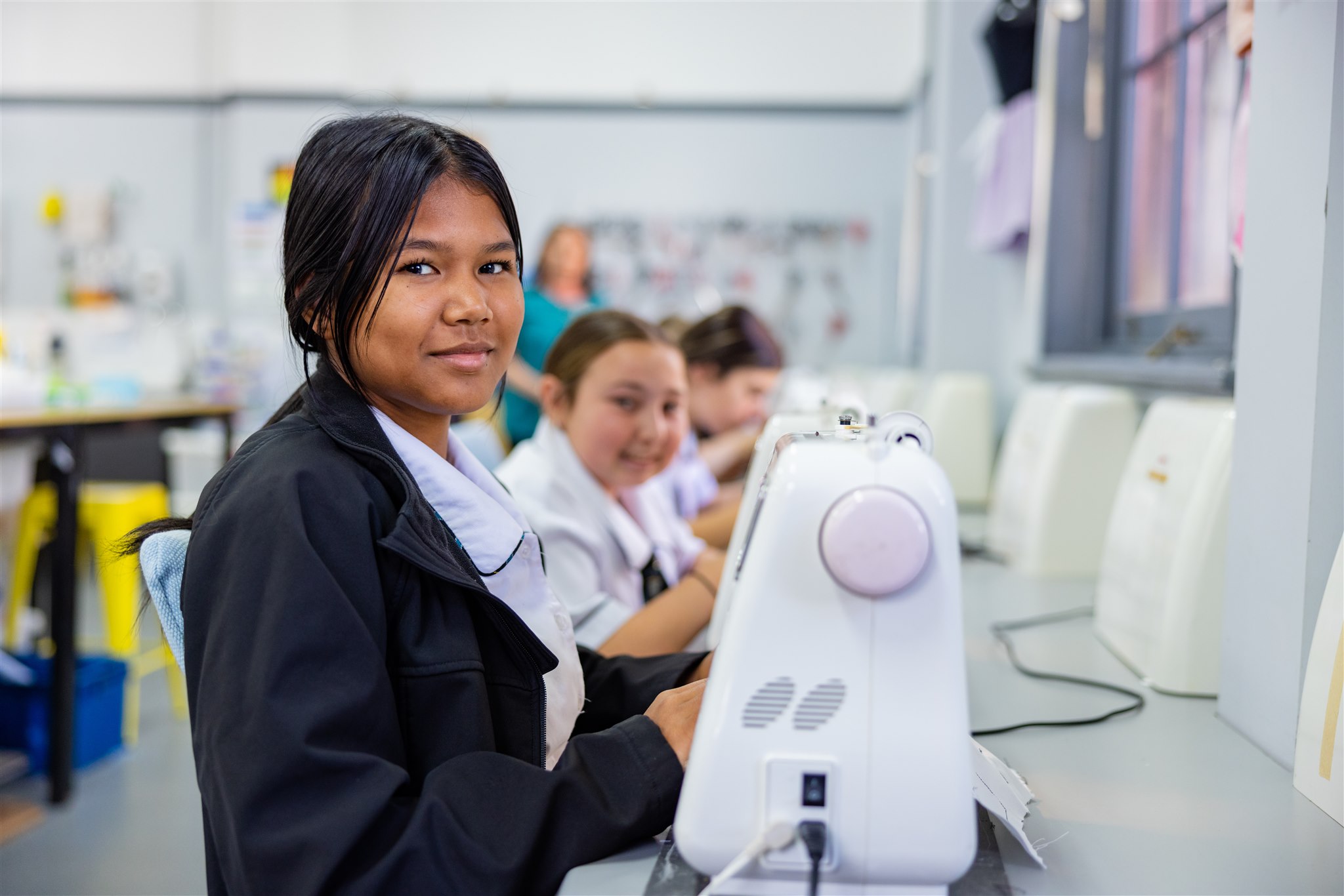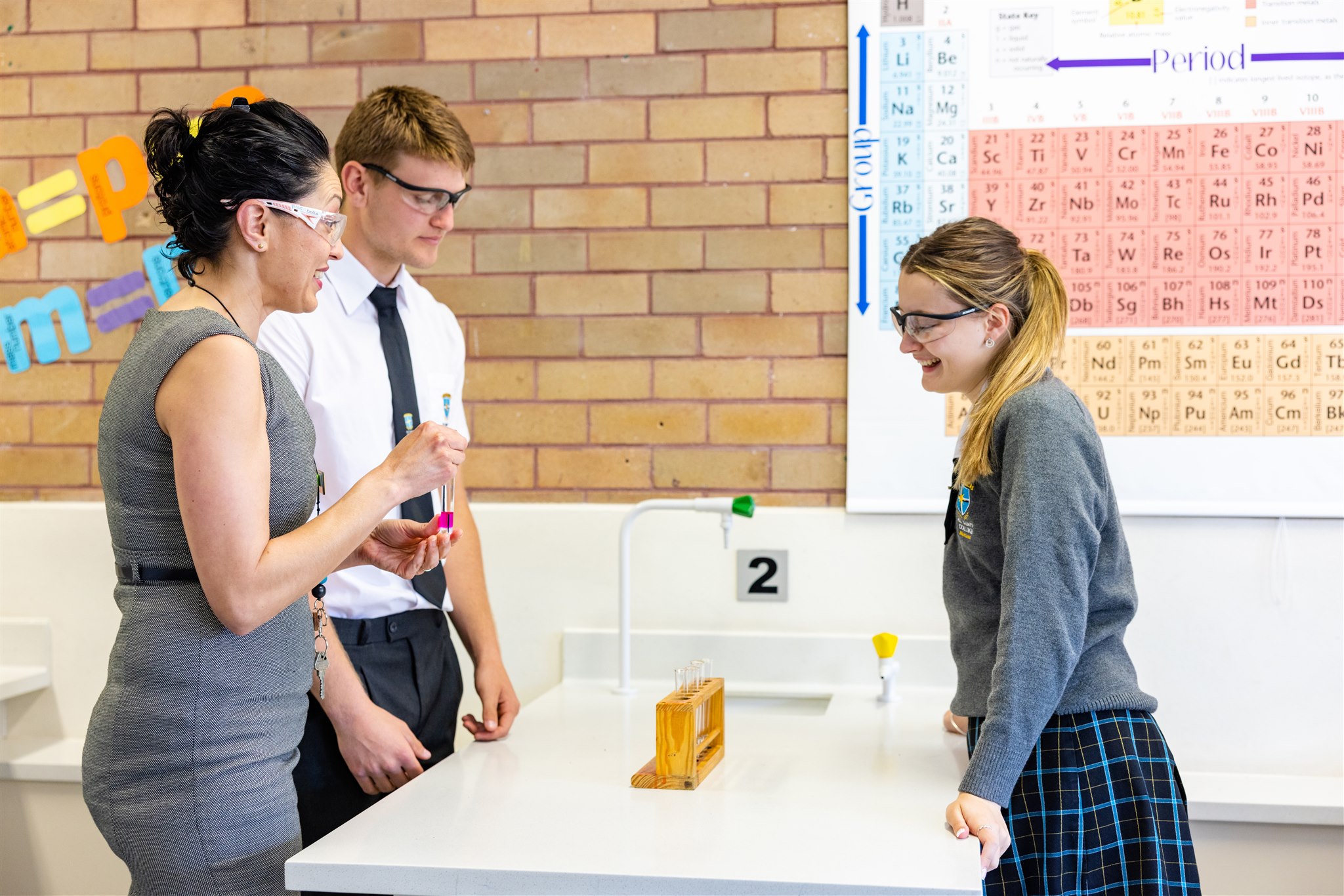All Saints' College
Curriculum
A continuous improvement agenda so that every student may achieve their potential is the focus of learning at All Saints College. As such, classrooms are dynamic, and the way students are assessed is evolving to meet student reflect current best practice and meeting student needs. A focus on literacy and numeracy is prevalent in the junior school to ready students for senior studies. All Saints College aims to provide a diverse curriculum with a tailored pathway for each student to meet their individual needs, interests, and talents.
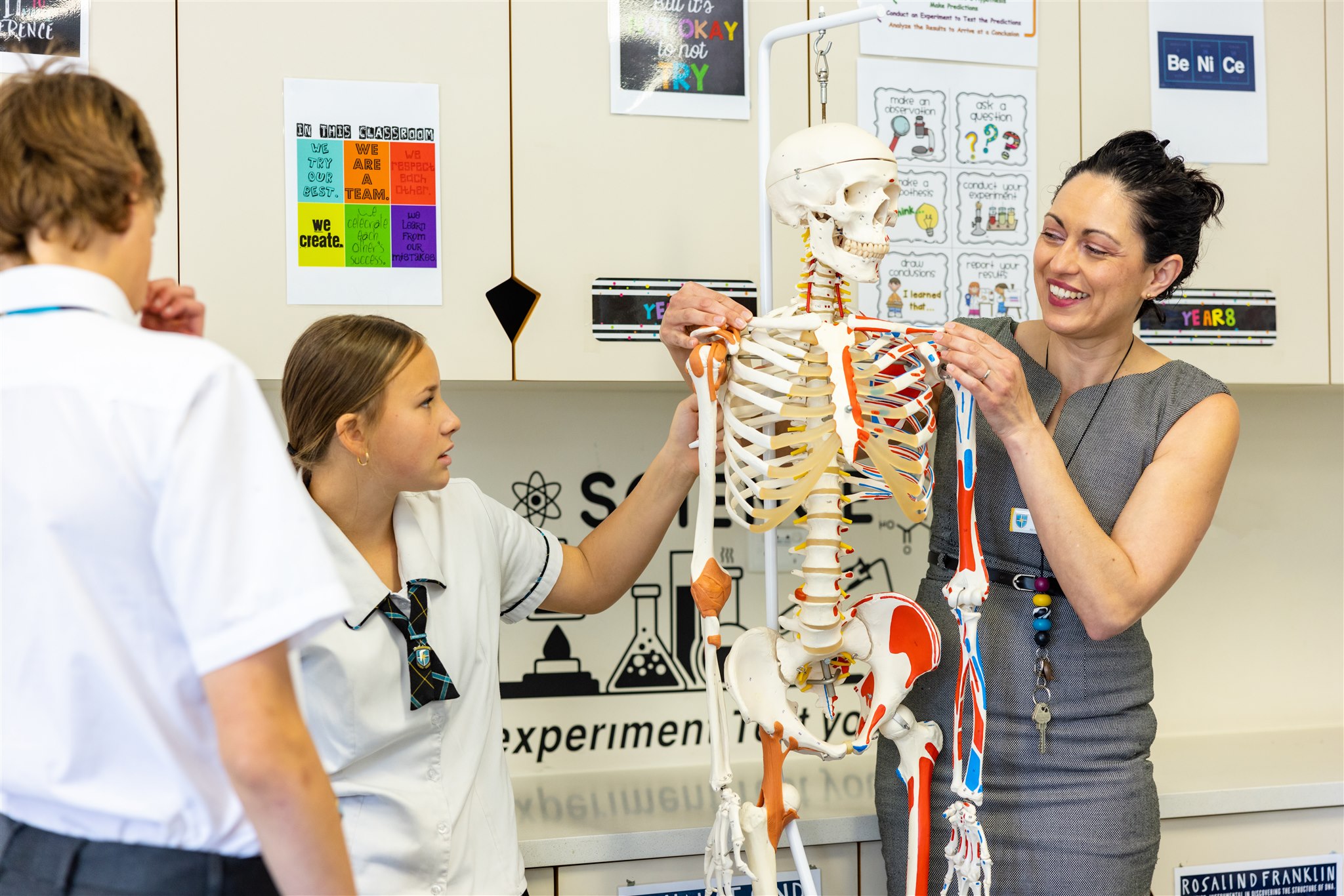
The College has recently moved to four 75 minute lessons a day which allows for the development of authentic deep learning to occur as teachers can plan more robust activities in the extended time as well as provide feedback and feed forward.
In additional to the set requirements of the NSW Curriculum, students have the opportunity to undertake:
- A gifted education mentor and access to the Diocesan Virtual Academy
- Accelerated and extension subjects in Stage 6 for targeted students
- A range of VET subjects offered at the College such as Hospitality, Construction, Retail and Business Services
- Studies in partnerships to complement their education such as school based apprenticeships and courses offered through TAFE NSW
- Life Skills programs including the Emmaus Centre, which caters for students with higher support needs.
All Saints College is reimagining learning as it moves towards a single campus and all the exciting opportunities this presents.
Program of Study
Year 7
- Religious Studies
- English
- Mathematics
- Science
- History
- PDHPE
- Music
- Mandatory Technology
- Visual Arts
Year 8
- Religious Studies
- English
- Mathematics
- Science
- Geography
- PDHPE
- LOTE
- Mandatory Technology
- Visual Arts
Year 9
- Religious Studies
- English
- Mathematics
- Science
- History
- Geography
- PDHPE
Two electives from the below list*:
- NESA developed courses
- Dance
- Drama
- Commerce
- Food Technology
- Graphics Technology
- Industrial Technology – Metal
- Industrial Technology – Timber
- Information Software Technology
- iSTEM
- Language
- Music
- Photography & Digital Media
- Physical Activity and Sports Studies
- Textiles Technology
- Visual Arts
- Visual Design
Year 10
- Religious Studies
- English
- Mathematics
- Science
- History
- Geography
- PDHPE
Two electives from the below list*:
- NESA developed courses
- Dance
- Drama
- Commerce
- Food Technology
- Graphics Technology
- Industrial Technology – Metal
- Industrial Technology – Timber
- Information Software Technology
- iSTEM
- Language
- Music
- Photography & Digital Media
- Physical Activity and Sports Studies
- Textiles Technology
- Visual Arts
- Visual Design
Year 11
English
- English Extension
- English Advanced
- English Standard
- English Studies
- English Life Skills
Mathematics
- Mathematics Extension 1
- Mathematics Advanced
- Mathematics Standard
- Mathematics Life Skills
- HSC Mathematics Standard 1
Religious Studies
- Studies of Religion II
- Studies of Religion I
- Studies in Catholic Thought
Science
- Biology
- Chemistry
- Earth and Environmental Science
- Physics
- Investigating Science
- Science Life Skills
HSIE
- Ancient History
- Business Studies
- Economics
- Geography
- Legal Studies
- Modern History
- Society and Culture
- Studies of Religion 2 Unit
- Studies of Religion 1 Unit
PDHPE
- Community and Family Studies
- Personal Development, Health and Physical Education
Creative Arts
- Dance
- Drama
- Music 1
- Visual Arts
LOTE
- Languages Beginners courses – French
- Languages Beginners courses – Italian
- Languages Continuers courses by Distance Education
Technology
- Design and Technology
- Engineering Studies
- Food Technology
- Industrial Technology – Electronics
- Industrial Technology – Graphics
- Industrial Technology – Multimedia
- Industrial Technology – Timber Products & Furniture
- Information Processes and Technology
- Software Design and Development
- Textiles and Design
VET
- Business Services
- Construction
- Electrotechnology
- Hospitality
- Retail Services
Content Endorsed Courses
- Computing Applications 1 Unit
- Exploring Early Childhood 1 Unit
- Sport, Lifestyle and Recreation Studies 2 Unit
- Sport, Lifestyle and Recreation Studies 1 Unit
- Visual Design 1 Unit
- Work Studies 1 Unit
- School Endorsed Courses
- Studies in Catholic Thought 1 Unit
Life Skills
Life Skills Courses are available in a wide variety of courses.
Year 12
English
- English Extension
- English Advanced
- English Standard
- English Studies
- English Life Skills
- HSC English Extension 2
Mathematics
- Mathematics Extension 1
- Mathematics Advanced
- Mathematics Standard
- Mathematics Life Skills
- HSC Mathematics Standard 1
Religious Studies
- Studies of Religion II
- Studies of Religion I
- Studies in Catholic Thought
Science
- Biology
- Chemistry
- Earth and Environmental Science
- Physics
- Investigating Science
- Science Life Skills
HSIE
- Ancient History
- Business Studies
- Economics
- Geography
- Legal Studies
- Modern History
- Society and Culture
- Studies of Religion 2 Unit
- Studies of Religion 1 Unit
- HSC History Extension 1
PDHPE
- Community and Family Studies
- Personal Development, Health and Physical Education
Creative Arts
- Dance
- Drama
- Music 1
- Visual Arts
LOTE
- Languages Beginners courses – French
- Languages Beginners courses – Italian
- Languages Continuers courses by Distance Education
Technology
- Engineering Studies
- Industrial Technology – Electronics
- Industrial Technology – Multimedia
- Industrial Technology – Timber Products & Furniture
- Information Processes and Technology
- Software Design and Development
- Textiles and Design
VET
- Business Services
- Construction
- Electrotechnology
- Hospitality
- Retail Services
Content Endorsed Courses
- Exploring Early Childhood 1 Unit
- Sport, Lifestyle and Recreation Studies 2 Unit
- Sport, Lifestyle and Recreation Studies 1 Unit
- School Endorsed Courses
- Studies in Catholic Thought 1 Unit
Life Skills
Life Skills Courses are available in a wide variety of courses.
Learning Support
Emmaus Centre
The Emmaus Centre supports the needs of a diverse range of students in the All Saints’ College community.
The Emmaus Centre is drawn from the story of the disciples who do not recognise Jesus as he joins them on the journey to Emmaus (Luke 24). The story from Luke’s Gospel tells us that they do not recognise Jesus but walked the journey with him and then invited him to join them and share a meal. It is not until he joins them for supper and breaks bread with them that they recognise him as Jesus.
The challenge for us in this scripture is to open our eyes and awaken to the experiences and challenges that surround us daily. We are encouraged to believe that every moment of life is an opportunity to encounter God, and like the disciples, God often speaks to us ‘along the way’, in the very ordinary experiences of our day; perhaps often through the most unlikely people or unexpected events. It is very easy to open our door to those we know and are friends with. For us, it is a reminder to recognise Jesus in all that we do especially in our work with students. The challenge is to be inclusive of all in our community just as the disciples were to the unknown Jesus.
Students who benefit from the Emmaus Centre include:
- Students with disabilities (primary focus)
- Students with learning difficulties
- ESL students
- Behavioural support
- Students with mental health concerns
- Organisational issues
- Social skills
- Gifted and talented students
- Anger management
- Life skills students
- Literacy and maths/numeracy support
- Special provisions
- General population (curriculum support)
- Aboriginal and Torres Strait Islander students
- Assistive technology
- Students who are unable to access classrooms (e.g. upstairs) because of injury.
Principles of Operation
The support a student receives is primarily based on their level of need. A students’ level of need may fit in at any stage as shown in the ‘Continuum of Support’. This can be at the lower levels of need that may require teacher awareness of appropriate strategies up to students who may require Life Skills syllabus outcomes to be delivered in a separate classroom setting. At All Saints’ College, that level of support is determined through a collaborative planning process involving teachers, parents, learning support staff and speciality advice from the CSO (as required).
Staffing
Staffing within the Emmaus Centre fluctuates each year depending on the needs of the students enrolled in the school. We have eight Learning Support aides, four Learning Support Teachers and one Indigenous Support aide. This allocation includes the following staff members with roles that include, but are not limited to:
Learning Support Coordinator
- Managing learning support faculty
- Case management of students
- Documentation management (including funding applications and planning documents)
- Teaching of Life Skills class
- Assisting Studies Coordinators with planning for Life Skills
- Adjustments to teaching and learning strategies and activities.
Learning Support Teachers
- Providing supervision and intervention within Emmaus Centre, including programs based on needs of students
- Case management of some students
- Teaching of Life Skills class
- Assisting class teachers with teaching of Life Skills students
- Assessment task support
- Adjustments to teaching and learning strategies and activities.
Learning Support Assistants
- Directly assist students in the classroom
- Assisting students with various school activities
- Assisting students with individualised program.
Venue and Resources
The Emmaus Centre is housed in Marcellin Place in rooms MG4, MG5 and MG7. MG4 is a full-size classroom and is used as a support centre for students who receive individual or small group assistance. MG4 has a range of assistive technologies including a SMART Board, laptops and iPads that each have a range of support software programs and apps. The room also has a mixture of furnishings to suit the needs of the activities. MG5 is a purpose classroom that is staffed full-time for children who have discrete Life Skills classes. MG7 is used for meetings, individual student assessments and small group work. Students also use the adjacent library space as required. These spaces allow for great versatility in the ways in which we can help our students.
The Learning Support Team
The Learning Support Team provides students with the support required to help them to participate in and contribute to College life. The team includes the Assistant Principal – Welfare, Learning Support Coordinator, School Counsellor and Careers Adviser. When a student with a specific learning need or disability is identified, a meeting with the Learning Support Team is usually the first step in supporting the student. The aim of a Learning Support team meeting is to gather as much information about the student as possible and discuss the ways in which the College as a whole and individual teachers can assist the student. The meeting will also give advice to the student that could help them to work effectively in Years 11 and 12 and can also involve looking at subject selections, pathways, careers advice and information about Disability Provisions, if appropriate.
Individual Health Care Management Plans, Mental Health Care Plans & Response Plans
The Learning Support Team also meets to develop Individual Health Care Plans and Response Plans for students as needed. These are created with input from parents, carers and external support services to help ensure the wellbeing and safety of every student in our care, so it is important that the College is informed of any health condition that a student may have.
Learning Support Plans
After the Learning Support Team gets to know and understand the specific needs of a student, a Learning Support Plan/Individual Education Plan (IEP) is developed and this information is distributed to staff as appropriate.
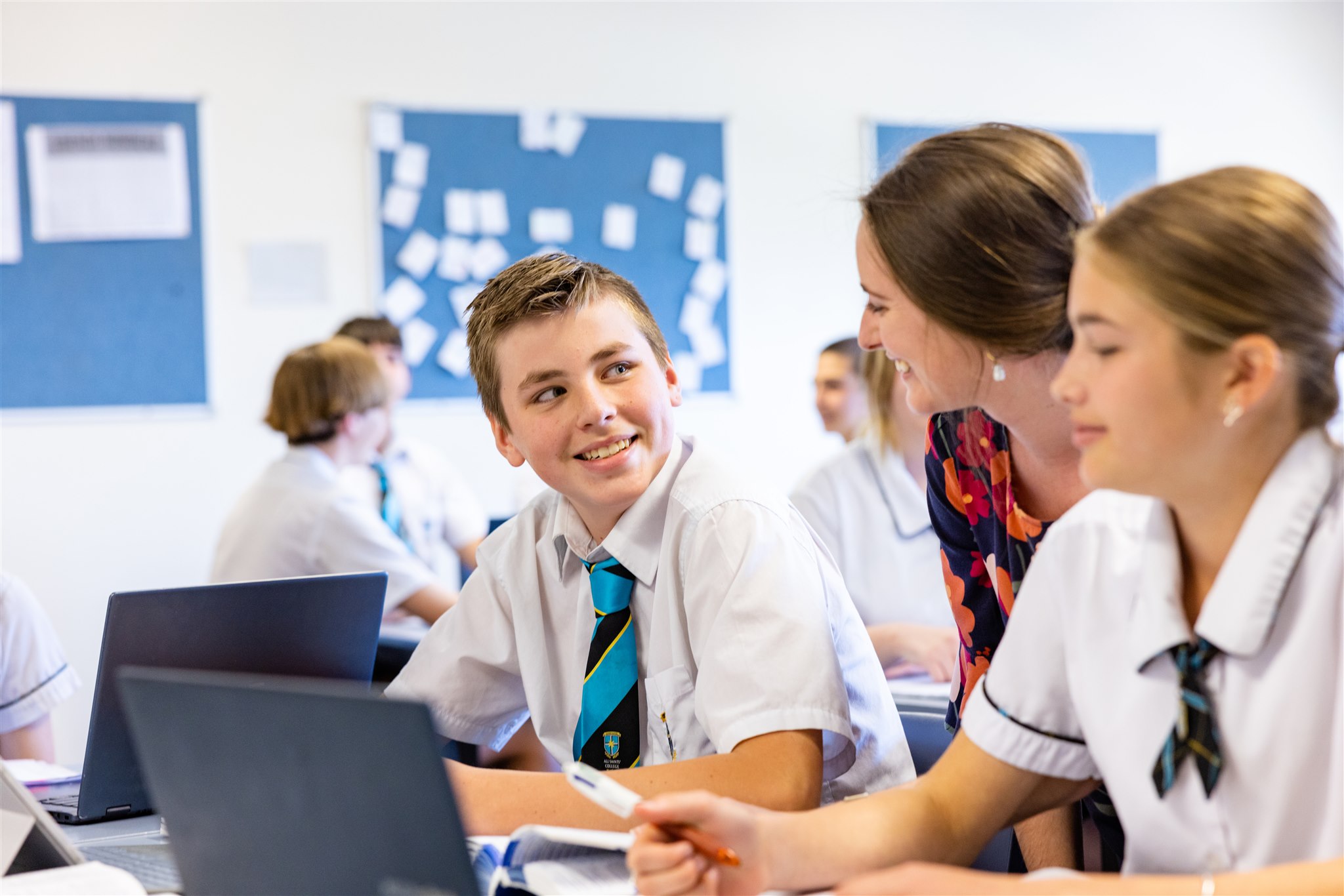
NAPLAN
All students in Years 7 and 9 in Australia are required to sit the National Assessment Program Literacy and Numeracy (NAPLAN). NAPLAN takes place over three days in the second week of May each year with testing in Literacy (Writing, Reading and Language Convention) and Numeracy (non-calculator and calculator). Parents and the school will receive a statement of performance. The school uses NAPLAN results to indicate future planning and teaching needs.
Aboriginal Education
All Saints’ College has a vibrant Aboriginal student population who are supported and encouraged in their endeavours and academic studies. Acedemic, Cultural and Community support for Aboriginal students is continuous and individualised at All Saints’ College. We are proud of the many opportunities provided to all students to increase cultural knowledge of and pride in Aboriginal and Torres Strait Islander cultures.
Academic
- A transition program enables students from feeder schools to meet and form an identity with the College.
- We provide students with support and information regarding further education options, employment opportunities and trade training.
- We assist students to connect with Aboriginal support services and organisations at Universities and other further education institutions and training facilities.
- Supply information regarding suitable job vacancies.
- Review student progress in all aspects of their education, with the aim of assisting students to complete Year 12 or move on to secure employment.
- Assist where necessary to ensure students wellbeing.
- Offer mentoring – in Aboriginal society mentoring was embedded in all aspects of life. A child was nurtured and supported by way of story, dance and other forms of learning. Mentoring is a process that is important to all students but is particularly important to Indigenous students as it allows students to develop a relationship where the mentee has a major say in setting the agenda, with the mentor providing support and guidance where necessary.
- One on One tutoring.
- Assistance with University applications and scholarship applications.
- Mentor meetings.
- Leadership program/opportunity for year 12 student/s.
- Providing students with resources, such as rocks and paints, to participate in team building skills and connecting to country.
- Special sport opportunities and participating in Aboriginal sport competitions.
- Greater tutoring opportunities inside and outside of school hours.
- Greater involvement in leadership within the school.
- Educational and study programs.
- Aboriginal badges.
- Individual learning plans (PLP’s).
- Professional development opportunities.
Culture and Community
- We are committed to developing connections with family, guardians and the local indigenous community.
- We join and attend local AECG (Aboriginal Educational Consultative Group) meetings.
- Invite Wollotuka Institute to address students and their families.
- Assist students to engage in special cultural events. Encourage connection to culture, support for Aboriginality and their story.
- Involve students in preparation for liturgies and special events; NAIDOC, Reconciliation and Diocesan events.
- Gaining flagpoles for the school and having the Aboriginal and Torres Strait Islander flags beside the Australian and Dominican.
- Organising support networks outside of school such as counselling and tutoring.
- Special lunch meetings.
- Connecting with Indigenous students from all CSO schools.
- Aboriginal artwork for the school hall or library .
- Connecting to aboriginal spirituality and country excursions.
- More liaise with aboriginal elders and big brother/big sister programs.
- Celebrations and awareness for students and staff at St Mary’s such as Reconciliation Day assemblies, smoking ceremony for opening of hall, closing the gap programs etc.
- Connecting to AIME (Aboriginal Indigenous Mentoring Experience).
Co-Curricular
All Saints’ College highly values the pursuit of academic excellence. Teachers are committed to assisting all students to reach their academic potential through a range of academic endeavours outside of the classroom. These include the Science and Engineering Challenge, Tournament of the Minds, Mock Trial Competition, Public Speaking Competition, the Lions Youth of the Year Competition and Debating.
Students are also encouraged to participate in various national competitions including Mathematics, English, Science, Chemistry, Business Studies, Geography and Computers. All of these endeavours, in addition to many others, enhance the academic potential of our students.
Science & Engineering Challenge
All Saints’ College has competed with distinction in the Science and Engineering Challenge for the past eight years. In 2012 and again in 2015, the school came first in Australia. On both occasions, the school won the National Final competing against schools from New South Wales, South Australia, Victoria, Tasmania and Queensland. The final was held in Geelong, Victoria, with All Saints’ College running out winners by 108 points. The school has also placed first in the silver division in 2008, 2009 and 2010, and came second in the silver division in 2011.
The Science Challenge team has had a successful campaign to date in the 2017 Challenge. The team was named Regional Champions after the initial day of competition and have since become the State NSW Champions. The team will now progress to the National Final to be held in Dubbo in November. Teams from each state will compete on Friday 3 November 2017.
The University of Newcastle & NSW DET Gifted and Talented Program
This program is run to provide pathways for exceptional students to undertake first year university courses while attending school. In 2013, courses included Molecules, Cells and Organisms (BIOL1001), Elementary French (FREN1100), Introduction to Engineering Practices (GENG1803), Legal System and Method A (LAW101A) and World Religions (RELI1010).
Through the Gifted and Talented Policy we aim to:
- Establish a Gifted and Talented team comprising qualified, experienced and/or interested teachers relating to the provision of Gifted Education
- Provide timely training and professional development opportunities for teachers and appropriate personnel
- Ensure early and ongoing identification and recognition processes of all students
- Provide equity in accessing opportunities and resources for all students
- Extend and challenge students at levels appropriate to their ability
- Create a flexible curriculum to meet individual needs
- Provide the opportunity, where appropriate, for students to advance through school stages (acceleration) at rates suited to ability, personal maturity and learning outcomes
- Provide the opportunity for contact with similarly talented or gifted peers through withdrawal, groupings or separate classes
- Provide necessary resources to support the teaching and learning of gifted students
- Involve parents and the wider community, where appropriate
- Provide ongoing support for students, teachers and parents
- Explore links within and across the Diocese and other systems.
Tournament of the Minds
Involvement in Tournament of the Minds requires skills in teamwork, organisation and creative thinking as well as significant commitment from the students throughout Term 3. This year, All Saints’ College was represented by a team in each of the Language/Literature, Science/Technology, Engineering/Maths and Social Science disciplines of the Tournament of the Minds.
The first part of the competition, the Long-Term Challenge, involves creating costumes, props and creative movement for a 10 minute drama presentation in which the team presents their solution to a set challenge. The second part of the tournament, the Spontaneous Challenge, involves teams creating a solution to a question within a time limit of 4 minutes. For each of the challenges, teams are awarded points for teamwork and creativity. Our Language/Literature team excelled in the spontaneous challenge and were awarded full marks.
In 2016 at Regional level our Science/Technology team was awarded Tournament Honours and our Engineering/Maths and Language/Literature teams were awarded Regional Winners.
In 2017 at Regional level our Social Science team and our Language Literature team were awarded Tournament Honours and we were awarded first place in the Engineering/Maths and Language/Literature and Science/Technology divisions.
At State level we were awarded Honours to our Language Literature team and first place to Science Technology team. The Science Technology team went on to represent NSW at the Australasian Pacific Final in Adelaide.
